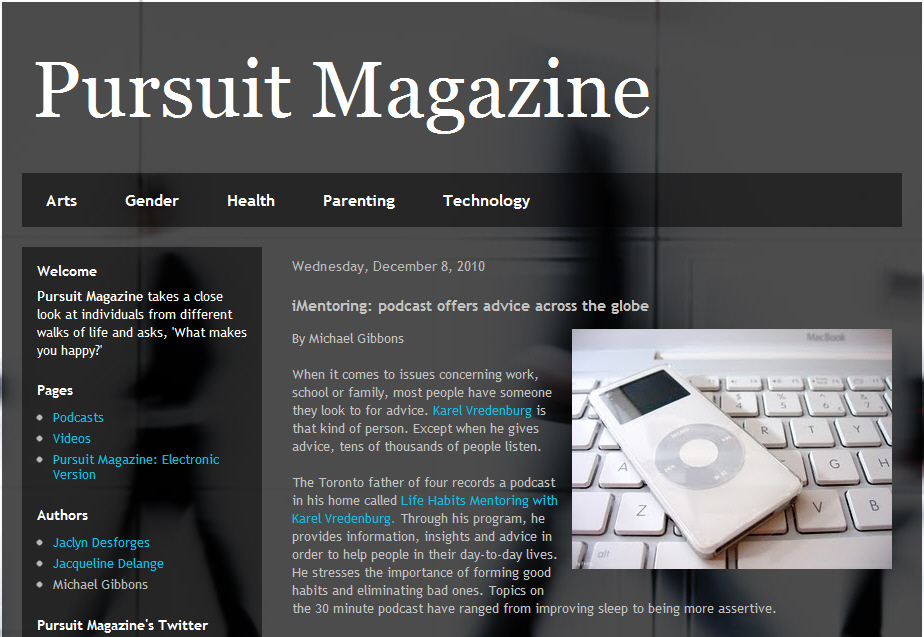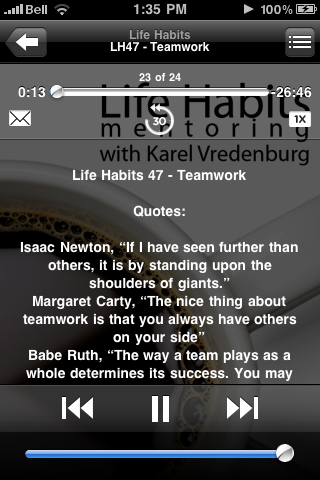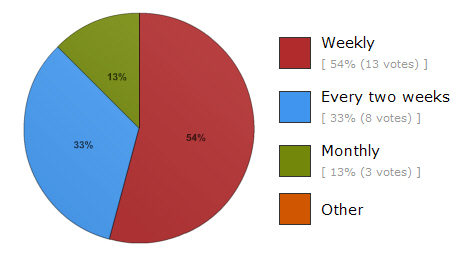Top 10 Life Habits Podcast Episodes
I've been reflecting on all the top ten this and top ten that I've seen on blogs and the social networks toward the end of the year. That got me thinking about what the top ten Life Habits podcast episodes would be. I had a look and aggregated the results from several of the top countries and found some pretty interesting results. They reflect the top ten episodes being listened to right now. The list may also be interesting to you if you haven't listened to the full 67 episodes produced to date and would like to listen to ones that other listeners are particularly interested in. This list may also be of interest to people who just got a device for Christmas and want to get into podcast listening too.
So, here's the list (the numbers in parentheses indicate the episode number):
- Types of Help (LH67)
- Assertiveness (LH49)
- Managing Stress (LH24)
- Visualizing Progress (LH64)
- 5 Lazy Ways to Get in Shape (LH66)
- Life Lessons (LH65)
- Stop Procrastinating (LH46)
- Time Management (LH2)
- Staying Positive (LH3)
- The Power of the Mind (LH4)
Many podcasts that deal with news or technology developments are time sensitive and listeners typically only listen to the most recent episode and past episodes have very little value because they're essentially old news. In contrast, my Life Habits episodes are essentially timeless and people regularly listen to the full list of epsides. Many listeners subscribe and listen to every episode as it comes out but others selectly listen to podcast topics that specifically interest them.
The most listened to episode right now is the most recent one that I did with UK Psychologist Mandy Kloppers.  In addition to being the most recent, it is a topic that I would think would be of particular interest to many of the listeners and Mandy also does a really good job of outlining the types of situations and challenges that would be appropriate for which to seek some professional help, the types of help that are available, and also what to expect and how to get the most out of the various types of professional help. Many people also have difficulty being appropriately assertive so that comes in as the second more popular episode. The session provides information on how to avoid being to unassertive but also very importantly to avoid being too aggressive too. We live in a rather stressful world so managing stress comes in at position three. Visualization of your goals and visualizing progress toward them is important and the episode on that topic came in at position four. The session with my regular guest Marie-Josée Shar on five lazy ways to get into shape is especially of interest at the moment when many people have resolved to get into better shape so this episode came in at position five. Steve Jobs's life lessons came in at the sixth position. The common challenges of procrastination, time management, and staying positive took positions seven, eight, and nine. The tenth slot was taken by my session on the power of the mind during which I describe the various biases we have and often don't know we have. If you'd like to check out these episodes, you can do so by going to the podcast page on iTunes or the show notes site.
In addition to being the most recent, it is a topic that I would think would be of particular interest to many of the listeners and Mandy also does a really good job of outlining the types of situations and challenges that would be appropriate for which to seek some professional help, the types of help that are available, and also what to expect and how to get the most out of the various types of professional help. Many people also have difficulty being appropriately assertive so that comes in as the second more popular episode. The session provides information on how to avoid being to unassertive but also very importantly to avoid being too aggressive too. We live in a rather stressful world so managing stress comes in at position three. Visualization of your goals and visualizing progress toward them is important and the episode on that topic came in at position four. The session with my regular guest Marie-Josée Shar on five lazy ways to get into shape is especially of interest at the moment when many people have resolved to get into better shape so this episode came in at position five. Steve Jobs's life lessons came in at the sixth position. The common challenges of procrastination, time management, and staying positive took positions seven, eight, and nine. The tenth slot was taken by my session on the power of the mind during which I describe the various biases we have and often don't know we have. If you'd like to check out these episodes, you can do so by going to the podcast page on iTunes or the show notes site.
Back from the Life Habits Hiatus
Life sometimes gets busy. Mine got a lot busier than my normal busy over the past while which also resulted in an unplanned hiatus from my Life Habits podcast series. The podcast is my hobby and a particularly enjoyable passion of mine. However, when things get busy, our hobbies get squeezed and this one of mine did.
A staycation during the US Thanksgiving break allowed me to get caught up. I recorded an episode titled Life Lessons which was a companion to the previous blog post on this site about Steve Jobs. The blog post focused specifically on Steve's contributions to design while the podcast episode dealt more broadly with the advice and lessons we can glean from Steve's life.
I also just completed an interview episode titled "5 Lazy Ways to Get in Shape" with Marie-Josée Shaar.  She and Kathryn Britton recently published a great new book "Smarts and Stamina: The Busy Person's Guide to Optimal Health and Performance". My intereview with Marie-Josée covers a subset of the material in the book and includes advice to sleep all you need, to eat by design, to "do a mini", to not make it a big production, and to exercise on company time. I love how practical the advice is that she shares, the way she explains foundational concepts, the examples she provides, how she practices what she preaches, and how she clearly is living proof of the efficacy of the approach. Marie-Josée also knows of what she speaks in that she has a degree in Organizational Behavior from McGill University, a Master of Applied Psychology from University of Pennsylvania, and she's also certified as a Personal Trainer and is a Certified Nutrition and Wellness Consultant.
She and Kathryn Britton recently published a great new book "Smarts and Stamina: The Busy Person's Guide to Optimal Health and Performance". My intereview with Marie-Josée covers a subset of the material in the book and includes advice to sleep all you need, to eat by design, to "do a mini", to not make it a big production, and to exercise on company time. I love how practical the advice is that she shares, the way she explains foundational concepts, the examples she provides, how she practices what she preaches, and how she clearly is living proof of the efficacy of the approach. Marie-Josée also knows of what she speaks in that she has a degree in Organizational Behavior from McGill University, a Master of Applied Psychology from University of Pennsylvania, and she's also certified as a Personal Trainer and is a Certified Nutrition and Wellness Consultant.
I encourage you to check out these new episodes and let me know what you think.
Life Habits is on Facebook
Listeners of my Life Habits podcast have requested that I create a Facebook page for the series. Thus far, I've just had listeners join my personal Facebook page. However, given the interest and the opportunity to use the space to provide updates, photos, and behind-the-scenes information, I've now created a dedicated Facebook page. If you listen to the podcast, please visit the Life Habits podcast page on Facebook and click the "Like" button. I look forward to interacting with you over on the page. Thanks!
I've just had listeners join my personal Facebook page. However, given the interest and the opportunity to use the space to provide updates, photos, and behind-the-scenes information, I've now created a dedicated Facebook page. If you listen to the podcast, please visit the Life Habits podcast page on Facebook and click the "Like" button. I look forward to interacting with you over on the page. Thanks!
Getting Healthy
I've been thinking lately about the importance of being healthy. The impact on longevity, quality of life, and even the planet. The feedback I've been getting on my Life Habits podcast reinforces that a lot of other people are thinking about their health and improving it too. I had created podcast episodes some time ago on health topics but decided in response to listener questions to put together a few deeper sessions on the topic. I did a session with Marie-Josee Shaar on Sleep, Mood, Food, and Exercise (iTunes, website), and a further drill-down on Sleep (iTunes, website) and other on Exercise (iTunes, website) with Marie-Josee. I recorded a self-guided audio instruction session on progressive muscle relaxation (iTunes, website) and recently published an episode on adopting a plant-based diet and lifestyle with Dilip Barman (iTunes, website). I'd also like to recommend some iPhone apps that are particularly good at promoting health including MyFitnessPal (iTunes) and Get Running (iTunes). As John F Kennedy said, “Physical fitness is not only one of the most important keys to a healthy body, it is the basis of dynamic and creative intellectual activity.” And as Julius Erving rightly pointed out, "If you don't do what's best for your body, you're the one who comes up on the short end."
Habits podcast reinforces that a lot of other people are thinking about their health and improving it too. I had created podcast episodes some time ago on health topics but decided in response to listener questions to put together a few deeper sessions on the topic. I did a session with Marie-Josee Shaar on Sleep, Mood, Food, and Exercise (iTunes, website), and a further drill-down on Sleep (iTunes, website) and other on Exercise (iTunes, website) with Marie-Josee. I recorded a self-guided audio instruction session on progressive muscle relaxation (iTunes, website) and recently published an episode on adopting a plant-based diet and lifestyle with Dilip Barman (iTunes, website). I'd also like to recommend some iPhone apps that are particularly good at promoting health including MyFitnessPal (iTunes) and Get Running (iTunes). As John F Kennedy said, “Physical fitness is not only one of the most important keys to a healthy body, it is the basis of dynamic and creative intellectual activity.” And as Julius Erving rightly pointed out, "If you don't do what's best for your body, you're the one who comes up on the short end."
What's Interesting to Different Cultures?
My Life Habits podcast series is often included in the top 10 list of most popular podcasts in the self-help category on iTunes. I'm so gratified and humbled when I see those numbers. I don't check them all that often largely because it is actually quite difficult to do but what is most interesting to me is how the popularity differs by country. As you probably know, the iTunes store is organized by country. As a result, all rankings, ratings, and comments are shown separately per country. The podcast as a whole is typically popular in Canada, the US, the UK, and Australia. Interestingly, it is also popular in countries like India, the Dominican Republic, South Africa, and Singapore. The iTunes ranking algorithm appears to run constantly and results are updated several times per day. When I've periodically looked at this, it seemed to me that the popularity ranking differred per country depending on the latest podcast episode topic.
To determine whether certain topics are of greater or lesser interest to certain countries, I had a look at one of the tables that are presented in iTunes which shows the most popular episodes in that country. Here are the results for Canada, the US, and India.
 Canada
Canada
 United States
United States
 India
India
You've probably noticed that the results are heavily weighted toward podcast episodes that have been out the longest as they've had the greatest opportunity to be downloaded. However, the differences in the topics are nonetheless interesting to examine.
I find it interesting that Canada, a country of relatively recent immigrants, finds the "dealing with a flat world" the most interesting. That episode addressed approaches to effectively and sensitively dealing with colleagues and friends of diverse cultures worldwide. Canadians are also interested in practical topics like stopping procrastination and developing effective public speaking skills, exploring sex differences, as well as broadening topics like self-actualization.
Time management is of greatest interest to Americans indicating perhaps that the challenges of balancing multiple priorities with time pressures are of particular concern to them. US listeners are also particularly interested in keeping a positive perspective on life, simplifying life, learning about becoming fit for the long term, and finding out about the various ways our mind has power over us and how we can control that power.
Effective public speaking is of greatest interest to listeners in India, a topic that was of some interest to Canadians as well. Indian listeners also shared an interest in sex differences with Canadian listeners and the topic of fitness with American listeners. Listeners in India had a unique interest in fostering creativity and further developing their capacity for forgiveness and compassion.
I find these cultural differences fascinating as I do the realization that people all over the globe actually listen to what I have to say. That's so cool! These findings also make me wonder whether there are certain topics that I haven't addressed on the podcast that may be of special interest to particular countries. If you have any such topics, please send me an email at lifehabits@gmail.com.
iMentoring: Technology-Enabled Self-Improvement
I was interviewed recently for an article in Pursuit Magazine about my Life Habits podcast series. That piece and a comment from a listener that I read in the Australian iTunes store got me thinking about the changes taking place in the ways in which people can go about improving themselves. In the not so distant past, the options you had for getting help for improving yourself were limited to finding and then visiting with a personal life coach or mentor (often a Psychologist in private practice), buying a book on a subject that you wanted to improve upon, or sending for CDs or audio tapes that you learned about from ads in magazines or on television. While these types of self-improvement still exist and can be quite useful, people aren't limited to only these for-fee options. People can now use their Smartphone or iPod type portable audio player to find and play thousands of podcasts on a wide variety of self-improvement topics. Listener Toni in Australia points out a key benefit of podcasts like mine, "...you get the feeling that he is your own personal coach/mentor." Despite using a fairly impersonal communication mechanism, listening to podcasts particularly when using headphones can often give the listener an intimate connection to the person on the podcast which has the effect of reinforcing the messages being given and making them more personal. In addition, the podcasts are free, come out with a new episode on a regular basis, and the best of them encourage two-way communication and a feeling of community.
and a comment from a listener that I read in the Australian iTunes store got me thinking about the changes taking place in the ways in which people can go about improving themselves. In the not so distant past, the options you had for getting help for improving yourself were limited to finding and then visiting with a personal life coach or mentor (often a Psychologist in private practice), buying a book on a subject that you wanted to improve upon, or sending for CDs or audio tapes that you learned about from ads in magazines or on television. While these types of self-improvement still exist and can be quite useful, people aren't limited to only these for-fee options. People can now use their Smartphone or iPod type portable audio player to find and play thousands of podcasts on a wide variety of self-improvement topics. Listener Toni in Australia points out a key benefit of podcasts like mine, "...you get the feeling that he is your own personal coach/mentor." Despite using a fairly impersonal communication mechanism, listening to podcasts particularly when using headphones can often give the listener an intimate connection to the person on the podcast which has the effect of reinforcing the messages being given and making them more personal. In addition, the podcasts are free, come out with a new episode on a regular basis, and the best of them encourage two-way communication and a feeling of community.
A lot of people can be helped world-wide using podcasts. My own is popular in the major English speaking countries like the US, Canada, Australia, and the UK but increasingly it is also on the top 10 list of podcasts in countries like India and Singapore. Electronic delivery of mp3 files via iTunes makes all of this possible. It is quite phenomenal the increase in reach that these technologies afford and, in turn, the ability to have huge populations of listeners glean the benefits of these programs.
Of course, not all improvement can be self-improvement.  Mandy KloppersCertain problems still require one-on-one attention from a professional. In the case of my podcast, I only provide the podcast material myself but I regularly invite guests to join me on particular episodes to address topics on which they are experts. Those guests thus far have been professionals who also provide individual counselling in their offices as well as technology-mediated sessions. UK Psychologist Mandy Kloppers does it all. She runs Mandy Jane - Life Design and has consulting rooms in Woking, Surrey, UK, but also provides counseling by phone, email, text, and Skype. She specializes in personal relationships, depression, anxiety, and self-improvement/personal development. US-based Marie-Josée Shaar runs Smarts and Stamina which is dedicated to providing "accessible, high-quality, scientifically-based healthy mind, body, and productivity information" to help "cultivate
Mandy KloppersCertain problems still require one-on-one attention from a professional. In the case of my podcast, I only provide the podcast material myself but I regularly invite guests to join me on particular episodes to address topics on which they are experts. Those guests thus far have been professionals who also provide individual counselling in their offices as well as technology-mediated sessions. UK Psychologist Mandy Kloppers does it all. She runs Mandy Jane - Life Design and has consulting rooms in Woking, Surrey, UK, but also provides counseling by phone, email, text, and Skype. She specializes in personal relationships, depression, anxiety, and self-improvement/personal development. US-based Marie-Josée Shaar runs Smarts and Stamina which is dedicated to providing "accessible, high-quality, scientifically-based healthy mind, body, and productivity information" to help "cultivate Marie-Josée Shaar a positive work environment that promotes productivity, engagement, and innovation" by empowering clients "to make their best, most significant contributions everyday at work, at home, and in the world". Marie-Josée provides training to companies, counseling to individuals. and writes a great short newsletter.
Marie-Josée Shaar a positive work environment that promotes productivity, engagement, and innovation" by empowering clients "to make their best, most significant contributions everyday at work, at home, and in the world". Marie-Josée provides training to companies, counseling to individuals. and writes a great short newsletter. 
To participate in this iMentoring experience you simply need to subscribe to the Life Habits podcast within iTunes or go to the shownotes site. Recent episodes have included ones on taking things too personally and improving sleep. The latter episode was with Marie-Josée, and new episodes with Mandy and with Kathryn will be recorded very soon. Of course, don't limit yourself to my Life Habits podcast series, I'd suggest you check out the other fine self-improvement podcasts that are available as well and enjoy iMentoring.
Effective Management
A listener to my Life Habits podcast series asked me to address the topic of effective management in a podcast episode. I've been a manager for close to two decades and have recently been promoted to an executive management position. That got me thinking about what I consider to be the key ingredients to being an effective manager. I also realized that most of the ingredients are the same whether someone holds a formal position of manager or serves in a management like role (including parents, coaches, etc.). I had already devoted a previous episode to the topic of leadership, which I believe is closely related. Someone can be a manager without being a leader and a leader without being a manager but I believe both sets of skills are most effective together. I compiled some interesting quotes, put together a top 10 list (actually counted wrong and the list actually has 11 items in it), and recorded the podcast episode. You can access it within iTunes or via the show notes site. I'd appreciate any thought you may want to share after you listen to the podcast episode.
executive management position. That got me thinking about what I consider to be the key ingredients to being an effective manager. I also realized that most of the ingredients are the same whether someone holds a formal position of manager or serves in a management like role (including parents, coaches, etc.). I had already devoted a previous episode to the topic of leadership, which I believe is closely related. Someone can be a manager without being a leader and a leader without being a manager but I believe both sets of skills are most effective together. I compiled some interesting quotes, put together a top 10 list (actually counted wrong and the list actually has 11 items in it), and recorded the podcast episode. You can access it within iTunes or via the show notes site. I'd appreciate any thought you may want to share after you listen to the podcast episode.
Communicating Assertively
I do a podcast series called Life Habits Mentoring, as most of you probably know. I just recorded an episode on the topic of communicating assertively. I've always believed that interpersonal communication is critically important in all aspects of life, whether communicating the features of a design you've just done, discussing a problem with a family member, or expressing your views to a good friend.  I provide advice on how to achieve balance in your communication between being passive and not expressing your your views at all to being too aggressive and expressing your views at the expense of other people. I don't pretend that I'm perfect at this myself but I think the top 10 items I've compiled will make anyone more assertive and, in turn, more effective in life. You can listen to the podcast episode on my Life Habits show notes website or via iTunes.
I provide advice on how to achieve balance in your communication between being passive and not expressing your your views at all to being too aggressive and expressing your views at the expense of other people. I don't pretend that I'm perfect at this myself but I think the top 10 items I've compiled will make anyone more assertive and, in turn, more effective in life. You can listen to the podcast episode on my Life Habits show notes website or via iTunes.
Length of Podcast Episodes
I ask for feedback on my podcasts on a regular basis in order to further improve them. One recurring theme
Optimizing Teamwork
Most of what we do at work and at play is done with other people. However, little attention is often paid to enhancing what we do with others in teams. There is certainly lots of attention on how to improve the performance of sports teams but that isn't the case for other teams in work and educational settings. A listener of my Life Habits podcast series sent me a question on this topic. She used to be an Olympic athlete in a non-team sport and was now retired from sports and needing to learn how to work effectively and optimally on teams at work. I gave that some thought and came up with a list of ten ideas to consider in enhancing and optimizing the workings of teams. I recorded a podcast episode on the topic which you can listen to via the Life Habits iTunes page or via the web at the Life Habits show notes site. I would appreciate any thoughts you may have on the episode and the ideas discussed in it. (the photograph on the right is courtesy of Ingorrr via Creative Commons license)
of sports teams but that isn't the case for other teams in work and educational settings. A listener of my Life Habits podcast series sent me a question on this topic. She used to be an Olympic athlete in a non-team sport and was now retired from sports and needing to learn how to work effectively and optimally on teams at work. I gave that some thought and came up with a list of ten ideas to consider in enhancing and optimizing the workings of teams. I recorded a podcast episode on the topic which you can listen to via the Life Habits iTunes page or via the web at the Life Habits show notes site. I would appreciate any thoughts you may have on the episode and the ideas discussed in it. (the photograph on the right is courtesy of Ingorrr via Creative Commons license)
Frequency of Podcasts
I've been a podcaster for more than two years now, producing the UXDesignCast and Life Habits podcast series. I've often wondered at what frequency listeners would like to have the podcast delivered. My ideal frequency, and the frequency I like to receive the podcasts I listen to, is weekly. I listen to a lot of podcasts in a week and typically get through them all in the week. I get a fair bit of feedback from listeners, especially from those who listen to the Life Habits series. Of the feedback that concerns the frequency of episodes, listeners who write in generally ask for more frequent delivery of them. Of course, it could be the case that the people who write in are into the podcast the most and, as a result, want more episodes faster. Podcast download statistics aren't really much use in this regard because subscribers have the episodes delivered to them automatically as soon as they become available and it isn't possible to know when they actually listened to the episodes that were downloaded. I therefore decided to put up a quick poll to ask the question, "How frequently would you like to have podcast episodes made available?" with the response alternatives of "weekly", "every two weeks", "monthly", and "other". The results indicate that 54% of respondents prefer weekly episodes, 33% every two weeks, and 13% monthly. So, the vast majority of 87% would like to have episodes within a two week period and the majority of those prefer them to appear weekly. This tells me that I should continue to try to deliver on a weekly basis but, if circumstances prevent that and an episode comes out in two weeks, it will still satisfy most listeners. Of course, I do target putting out weekly episodes, particularly for my Life Habits podcast series. I'll continue to do that then and will try to increase the frequency of the UXDesignCast ones as well. Of course, feel free to provide any additional feedback you may have on this via the comment feature of this site.
therefore decided to put up a quick poll to ask the question, "How frequently would you like to have podcast episodes made available?" with the response alternatives of "weekly", "every two weeks", "monthly", and "other". The results indicate that 54% of respondents prefer weekly episodes, 33% every two weeks, and 13% monthly. So, the vast majority of 87% would like to have episodes within a two week period and the majority of those prefer them to appear weekly. This tells me that I should continue to try to deliver on a weekly basis but, if circumstances prevent that and an episode comes out in two weeks, it will still satisfy most listeners. Of course, I do target putting out weekly episodes, particularly for my Life Habits podcast series. I'll continue to do that then and will try to increase the frequency of the UXDesignCast ones as well. Of course, feel free to provide any additional feedback you may have on this via the comment feature of this site.
Getting Unstuck
We all experience it at some point - getting into a rut and not knowing how to get out of it. We may be working on a creative improvement in our careers, getting going with an exercise program, losing weight, increasing our expression of gratitude, improving our presentation skills, and so on. No matter what the focus of our desired improvement is, actually getting going on it is often really challenging. Of course, if it was easy, everyone would be doing it - and they're not typically. So how can you get yourself unstuck. I gave that some thought, found some inspirational quotes on the topic, put together a top 10 list of ideas, and put it all together in a Life Habits podcast episode. You can access it within iTunes, Zune, or at the show notes site. Of course, you can also listen to it right here on this website using the Life Habits player in the right column. Please note that the picture on the right is a good example of a reminder that is discussed on the podcast that can be used as inspiration and motivation in this case for starting a running program. The photograph is a Creative Commons Image courtesy of Thomas Hawk called "A Brand New Day".
increasing our expression of gratitude, improving our presentation skills, and so on. No matter what the focus of our desired improvement is, actually getting going on it is often really challenging. Of course, if it was easy, everyone would be doing it - and they're not typically. So how can you get yourself unstuck. I gave that some thought, found some inspirational quotes on the topic, put together a top 10 list of ideas, and put it all together in a Life Habits podcast episode. You can access it within iTunes, Zune, or at the show notes site. Of course, you can also listen to it right here on this website using the Life Habits player in the right column. Please note that the picture on the right is a good example of a reminder that is discussed on the podcast that can be used as inspiration and motivation in this case for starting a running program. The photograph is a Creative Commons Image courtesy of Thomas Hawk called "A Brand New Day".
Optimizing Body and Mind
I just completed an interview with Marie-Josee Salvas Shaar for my Life Habits podcast series. The topi c was sleep, food, mood, and exercise. It really got me thinking. Marie-Josee's theme throughout the session is that all four of these elements work together in an integrated fashion and working on each of them will yield a multiplicative overall effect. She has some great advice regarding what to eat in order to optimize creativity. She also stresses the importance of sleep and provides advice on getting good sleep. She describes ten recommendations each supported by research evidence. It is a worthwhile listen. You can get the episode on iTunes, Zune, or at my podcast show notes site. I'd appreciate any thoughts or comments you may have on it.
c was sleep, food, mood, and exercise. It really got me thinking. Marie-Josee's theme throughout the session is that all four of these elements work together in an integrated fashion and working on each of them will yield a multiplicative overall effect. She has some great advice regarding what to eat in order to optimize creativity. She also stresses the importance of sleep and provides advice on getting good sleep. She describes ten recommendations each supported by research evidence. It is a worthwhile listen. You can get the episode on iTunes, Zune, or at my podcast show notes site. I'd appreciate any thoughts or comments you may have on it.
Electronic Communication Podcast
I've been thinking a lot about the various types of electronic communication that we d eal with everyday and have blogged about aspects of it here as well. I've put together my thoughts and advice on everything from Facebook and Twitter to texting, instant messaging, e-mail, conference calling, and video conferencing in a podcast episode in my Life Habits series. I discuss my thoughts on how to effectively use these mechanisms as well as how to limit them as well. You can subscribe to the series via the iTunes store as well as the Zune store. You can also listen to the podcast episode right here on the blog. As usual, I'd very much appreciate any feedback you may have on the podcast episode via a comment on this blog and/or on the relevant pages within the iTunes and Zune stores.
eal with everyday and have blogged about aspects of it here as well. I've put together my thoughts and advice on everything from Facebook and Twitter to texting, instant messaging, e-mail, conference calling, and video conferencing in a podcast episode in my Life Habits series. I discuss my thoughts on how to effectively use these mechanisms as well as how to limit them as well. You can subscribe to the series via the iTunes store as well as the Zune store. You can also listen to the podcast episode right here on the blog. As usual, I'd very much appreciate any feedback you may have on the podcast episode via a comment on this blog and/or on the relevant pages within the iTunes and Zune stores.
Producing a Podcast - Part I
I've been creating podcasts for about a year and a half and during that time have been asked on a regular basis how I go about doing it. I've provided those who asked the details of whatever setup and procedure I used at the time. I've regularly improved upon the equipment, software, and settings. However, I'm pretty well satisfied with the setup that I have now so thought I'd share what I do and what I use here; that way, I simply have to point people here for all the details.
The most important aspect of doing a podcast is the content. The subject of the podcast series should be something that you know well and are passionate about. You'll be spending a lot of time on it and will need to produce episodes on a fairly steady basis so make sure that you choose your subject area carefully. It should also be a subject that others are interested in and that there aren't hundreds of podcasts on already. You can check what podcasts are available on various subjects by doing searches in the iTunes store. You should plan on creating a podc ast episode ideally on a weekly basis but every few weeks is usually acceptable too. Listeners start to develop an expectation of receiving your episodes at a particular cadence so you should try to stick to a steady schedule of delivery. There are times when get out of the regular rhythm but then just get back to it when you can. I was ill recently, for example, and then experienced laryngitis for weeks afterward which prevented me from recording episodes (having a voice is rather important in podcasting). I've heard that 30 minutes is the ideal length of a podcast although an hour or longer may be appropriate especially given panel type formats. A microphone is the most important piece of equipment you'll need. I use an Audio-Technica AT2020 microphone. It is what is refer
ast episode ideally on a weekly basis but every few weeks is usually acceptable too. Listeners start to develop an expectation of receiving your episodes at a particular cadence so you should try to stick to a steady schedule of delivery. There are times when get out of the regular rhythm but then just get back to it when you can. I was ill recently, for example, and then experienced laryngitis for weeks afterward which prevented me from recording episodes (having a voice is rather important in podcasting). I've heard that 30 minutes is the ideal length of a podcast although an hour or longer may be appropriate especially given panel type formats. A microphone is the most important piece of equipment you'll need. I use an Audio-Technica AT2020 microphone. It is what is refer red to as a large diaphragm condenser microphone. It has great sound but you need to also use a pop filter with it (to prevent an explosive sound when you say the letters 'p' and 't'). I use an Apex pop filter. I have both attached to a floor mounted microphone stand that doesn't touch any other surface such as the desk to prevent the picking up of any extraneous noise. I record in a room with broadloom and make sure that anything else that can make a noice isn't in the room or within earshot (even a cellphone on vibrate will be picked up by the microphone). I don't use a script but do make notes prior to the recording, the quotes and top 10 lists in the case of my Life Habits podcast and the list of articles and their links in the case of my UXDesignCast podcast).
red to as a large diaphragm condenser microphone. It has great sound but you need to also use a pop filter with it (to prevent an explosive sound when you say the letters 'p' and 't'). I use an Apex pop filter. I have both attached to a floor mounted microphone stand that doesn't touch any other surface such as the desk to prevent the picking up of any extraneous noise. I record in a room with broadloom and make sure that anything else that can make a noice isn't in the room or within earshot (even a cellphone on vibrate will be picked up by the microphone). I don't use a script but do make notes prior to the recording, the quotes and top 10 lists in the case of my Life Habits podcast and the list of articles and their links in the case of my UXDesignCast podcast).
Given the amount of material to cover, I'll divide this post into a Part I and a Part II. I'll address the actual recording and post-production software, settings, filters, uploading, and posting in Part II. As usual, feel free to contribute any of your own thoughts, experiences, and/or questions using the commenting capability of this blog.
Consolidating Sites
I've been maintaining several sites for some time and am now looking to consolidate. I m aintain this site, of course, which is my main blog but I also also maintain one site each for my two podcasts, UXDesignCast and Life Habits. I did add a widget to the right column of this blog that provides links to the podcast episodes but those links still go directly to the relevant pages within the particular podcast sites. I'd like to see if I can consolidate all content into this blog site. That requires the embedding of a podcast media player directly into the site. Even though blogger which this site runs on now has support for gadgets, I haven't been able
aintain this site, of course, which is my main blog but I also also maintain one site each for my two podcasts, UXDesignCast and Life Habits. I did add a widget to the right column of this blog that provides links to the podcast episodes but those links still go directly to the relevant pages within the particular podcast sites. I'd like to see if I can consolidate all content into this blog site. That requires the embedding of a podcast media player directly into the site. Even though blogger which this site runs on now has support for gadgets, I haven't been able  to find a general purpose podcast player gadget. Please let me know if you know of one. In the mean time, I'm trying out the only general purpose high quality player I'm aware of below. The file it plays is the latest episode in my Life Habits podcast series which for this episode included a guest interview with UK Psychologist Mandy Kloppers on the substantive topic of enhancing self-confidence and also the technical topic of using texting from a mobile/cell phone to get help with problems. These podcasts are also available directly in iTunes (here's the direct link to the specific podcast in iTunes) and most people simply subscribe to the podcast in iTunes. However, those who would like to read the show notes for an episode and have the streaming file directly available together with the notes, will now be able to do that on this blog site.
to find a general purpose podcast player gadget. Please let me know if you know of one. In the mean time, I'm trying out the only general purpose high quality player I'm aware of below. The file it plays is the latest episode in my Life Habits podcast series which for this episode included a guest interview with UK Psychologist Mandy Kloppers on the substantive topic of enhancing self-confidence and also the technical topic of using texting from a mobile/cell phone to get help with problems. These podcasts are also available directly in iTunes (here's the direct link to the specific podcast in iTunes) and most people simply subscribe to the podcast in iTunes. However, those who would like to read the show notes for an episode and have the streaming file directly available together with the notes, will now be able to do that on this blog site.
You should be able to play the podcast in context right within the blog post. If this works out, I plan to write my normal blog posts but also to include posts for my podcast episodes when they are available including the show notes material. I'd appreciate any thoughts you may have on this approach to consolidating content into a single site.
